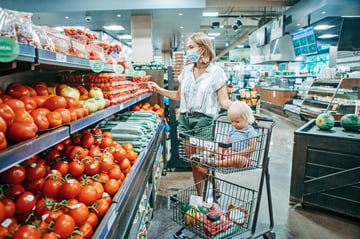Learn how FoodLogiQ customers are employing new communication strategies in our latest E-Book, 7 Ways FoodLogiQ Customers are Minimizing Risk During COVID-19.
The risk management programs developed in response to crises are only as good as your ability to communicate them. When attempting to rapidly deploy new procedures to mitigate risks associated with health concerns like the novel coronavirus disease (COVID-19), expectations, instructions and mechanisms for accountability must all seamlessly be deployed across an organization. Some programs will also require a public communications plan to ensure consumers are aware of changes to the shopping experience, and to build trust around your brand's commitment to health and safety.
The COVID-19 pandemic has forced every business in the food industry to examine and deploy new risk mitigation procedures. And with health guidelines and public orders varying on the state and local level, many brands are navigating the challenge of not only creating and enforcing new operational processes, but managing a range of location-specific programs and supplier requirements simultaneously.
A streamlined and comprehensive communications process is part and parcel with any new program, policy or shift in the makeup of your supply chain. In this blog, we cover how FoodLogiQ customers are leveraging the Connect platform to strengthen communications in three key areas:
- Internal communications and validation
- Location-specific supplier communications
- Leveraging validation in support of public communications
Internal Communication and Validation
Updating policies around store hours, capacity, new disinfection and sanitization procedures, or processes around exposures to serious pathogens needs to happen automatically and consistently. Not only do plans need to be dispersed across the organization, they need to be digestible, and their execution must be verifiable. Much of this is being done through the documentation and tracking of heightened cleaning procedures, standards and inspections.
Within FoodLogiQ Connect, customers have used the Incidents feature to create, deploy and review environmental checks and checklists to maintain clean, sanitary facilities, healthy employees and safe products. Utilizing this feature, inspection and checklist results can be tracked, shared and reviewed throughout the organization to ensure that protocol is being followed consistently. The same applies to additional use cases, such as monitoring employee health through screenings and tracking COVID-19 cases within the organization.
In addition, should a virtual audit occur, inspection templates and results alike are conveniently stored to maintain a record of the steps taken to uphold employee and consumer safety. FoodLogiQ customers are able to report on these measures by type to understand which sanitization measures are being followed on a regular basis, as well as to dig into areas of concern or interest.
Communicating with Suppliers Based on Location
Businesses are more reliant than ever on strong partnerships and need to ensure exceptional communication with outside stakeholders like suppliers. At a time when levels of quarantine differ by region on national and international levels, it’s extremely important to be able to communicate effectively across geographic locales. FoodLogiQ customers are using FoodLogiQ Connect functionality to ensure that suppliers receive explicit instructions, updates and documents based on the conditions specific to their location.
Communication formats vary, ranging from bulk to hyper-specific. For example, some customers have identified and filtered their suppliers by state within FoodLogiQ Connect, then using the Bulk Messaging feature to share protocols, policies and updates, and adding attachments when necessary. Others are using the community news area within the supplier dashboard to share broad, structured pieces of information that apply to all of their suppliers across the board. And finally, others are using direct messaging to discuss specific feedback, requests or follow-up items with suppliers on an individual level.
At the same time, some FoodLogiQ customers have begun to leverage document tags, which allow them to tag and dynamically share documents within a specific category, such as by location, role or event. For example, documentation related to FSVP audits can be tagged as such in preparation for submission to the FDA. The tag is dynamic, automatically updating the documents associated with it as changes occur, making the task of managing dozens of documents much easier.
Learn more about how to improve your documentation management practices and strengthen your supplier relationships as a whole in our upcoming demo on May 28th; Register here.
Managing Supplier Communication using FoodLogiQ Connect
Public Communications and Announcements
Some of the new programs deployed during a crisis may be of public interest, or relate directly to customer experience; many changes to services, in-store procedures, product availability and location hours are essential pieces of information for consumers. The public is navigating changes on a daily basis, and is more likely to purchase food from businesses that are transparent about their commitments to safety and crystal clear about when services are operant.
Ensure your marketing team is kept in the loop of all new risk mitigation programs and updates, and share documentation verifying compliance throughout your supply chain. Whether it’s via email marketing, website pop-ups and pages, social media or press releases, this information can help your team craft important messages and updates that educate your customers on new policies and inform them of the lengths your team is going to prioritize their health, in addition to that of your employees.
More Ways FoodLogiQ Customers are Minimizing Risk
FoodLogiQ customers are leveraging our supply chain management, traceability and recall management software to reduce public and business exposure to risk during the coronavirus crisis. Read our E-Book, 7 Ways FoodLogiQ Customers are Minimizing During Covid-19, to learn more tactics for addressing the complex challenges arising in the New Normal. Download E-Book
Tag(s):
Other posts you might be interested in
View All Posts
Product Formulation
10 min read
| February 24, 2023
The Price of Safety: Understanding the True Cost of a Food Recall
Read More
6 min read
| May 4, 2023
Five Strategies to Stay on Top of Consumer Food Trends
Read More
8 min read
| June 8, 2023

